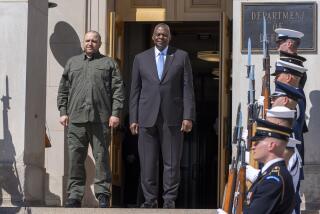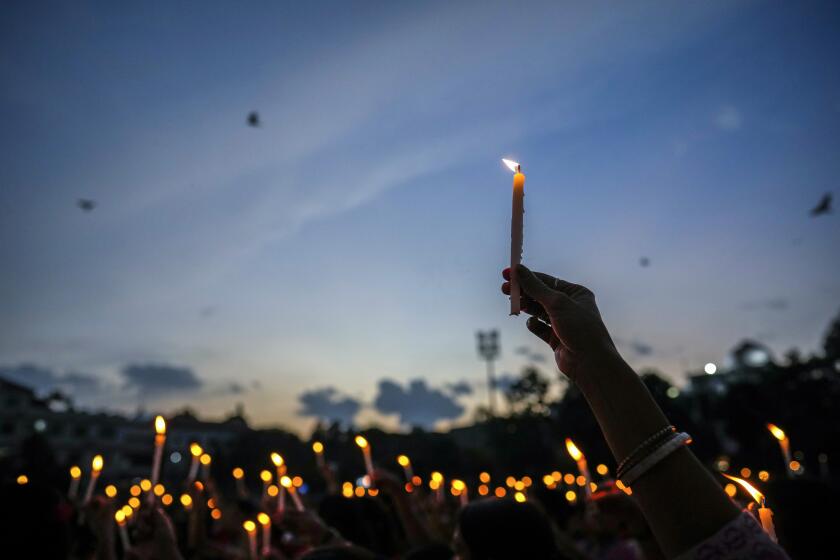Bush seeks billions more in military funding
Setting up another confrontation with congressional Democrats over the war in Iraq, President Bush on Monday sent Congress a $45.9-billion emergency funding request for expenses related to U.S. military campaigns around the world.
The request, which comes on top of $147.5 billion sought by the administration earlier this year, pushes the cost of the wars in Iraq and Afghanistan to more than $600 billion.
It also appears certain to further inflame tensions between the president and his Democratic critics on Capitol Hill, who are locked in a rancorous debate over federal spending bills as well as the war.
“Demanding nearly $200 billion for Iraq while vetoing healthcare for 10 million children exemplifies the Bush administration’s misplaced priorities,” House Speaker Nancy Pelosi (D-San Francisco) said Monday, comparing the budget requests with the president’s objection to spending $30 billion to expand a popular health-insurance program for children.
Despite repeatedly failing to force a change of U.S. policy in Iraq, many Democrats have pledged to restrict additional money for the war to paying for a withdrawal of troops.
Standing with a group of veterans in the Roosevelt Room of the White House, Bush appeared to invite the new showdown.
“I know some in Congress are against the war,” he said.
“But they ought to make sure our troops have what it takes to succeed. . . . Congress should not go home for the holidays while our troops are still waiting for the funds they need.”
Bush further needled Democrats with a pointed suggestion that lawmakers keep the bill “focused on true necessities, not pet projects.”
The last war supplemental funding bill, approved in May, included millions of dollars for programs unrelated to defense, such as aid to agriculture.
The Bush administration, too, has used prior emergency funding requests to secure money for items tangentially related to the wars in Iraq and Afghanistan, including the F-35 Joint Strike Fighter program, which is scheduled to begin delivering the aircraft in 2009.
Pentagon officials on Monday emphasized that the latest request focused on the most critical needs.
The biggest single item is expanded production of “mine resistant ambush protected,” or MRAP, vehicles, which the Pentagon hopes will protect troops from roadside bombs better than the widely used Humvee.
In July, the Pentagon requested an additional $5.3 billion for the MRAP program. The request submitted Monday seeks an additional $11 billion for 7,274 vehicles. Altogether, the administration hopes to build 15,274 of the trucks.
The White House wants to use $8.8 billion to alleviate equipment shortfalls by purchasing new tanks, F/A-18 fighter jets and other weapons systems.
Maintaining the continued presence of additional personnel that are part of Bush’s troop increase will require $6.3 billion, defense officials said. Under the current plan, the last of the additional forces will leave Iraq in June.
Additionally, the administration is seeking more than $1.7 billion for medical care for wounded service members and $2.2 billion for international aid to Sudan, the Palestinian territories, Pakistan and elsewhere.
“All of these are urgent priorities of the United States,” Bush said. “Congress should fund them without delay.”
Senior Democrats, who increasingly have worked to highlight what is being sacrificed to pay for the war, have indicated that they will not cut off money needed to sustain troops in the field.
Rep. David R. Obey (D-Wis.), House Appropriations Committee chairman and a fierce opponent of the war, has not indicated how he would separate money vital to the troops from other administration requests.
But Obey, whose panel drafts funding bills, has pledged not to move the emergency spending bill out of committee unless Bush agrees to change policy in Iraq.
And last week, 89 House members -- more than a fifth of the chamber -- sent Bush a letter outlining their determination to approve additional funding only for redeploying U.S. forces.
“Congress should not approve another dime for him to run out the clock on his failed policy,” said Rep. Barbara Lee (D-Oakland), who organized the letter.
More to Read
Sign up for Essential California
The most important California stories and recommendations in your inbox every morning.
You may occasionally receive promotional content from the Los Angeles Times.











